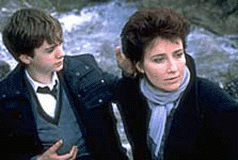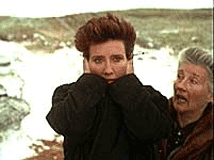|
Newest Reviews:
New Movies -
The Tunnel
V/H/S
The Tall Man
Mama Africa
Detention
Brake
Ted
Tomboy
Brownian Movement
Last Ride
[Rec]³: Genesis
Hara-Kiri: Death of a Samurai
Indie Game: The Movie
Abraham Lincoln: Vampire Hunter
Old Movies -
Touki Bouki: The Journey of the Hyena
Drums Along the Mohawk
The Chase
The Heiress
Show
People
The Strange Affair of Uncle Harry
Pitfall
Driftwood
Miracle Mile
The Great Flamarion
Dark Habits
Archives -
Recap: 2000,
2001, 2002,
2003, 2004
, 2005, 2006,
2007 , 2008
, 2009 ,
2010 , 2011 ,
2012
All reviews alphabetically
All reviews by star rating
All reviews by release year
Masterpieces
Screening Log
Links
FAQ
E-mail me
HOME
| |
The Winter Guest (Alan Rickman) 1997
 The Winter Guest,
Alan Rickman’s debut feature, outwardly appears to be the sort of
Oscar-friendly movie that Lasse Hallström has begun churning out each year for
Miramax. It’s set in a picaresque small Scottish town, and is ultimately about
people being made to come out of their emotional shells. The big exception here
is that The Winter Guest, unlike
something like Chocolat, actually
manages to be good. The film, which takes place entirely during one wintry day
and focuses on four pairs of people, stars Phyllida Law and Emma Thompson, who
are mother and daughter in real life, as Elspeth and Frances, a mother and
daughter who have a close but troubled relationship. Law’s performance as
Elspeth is especially good, and it has the same mixture of stubbornness and
tough love that have marked much of Judi Dench’s work lately, but it has none
of her condescension. Elspeth is proud to be a member of the community she’s
in. She’s not smug at all, even if she’s not afraid to bluntly state what
she likes. Her daughter is in a bit of a funk ever since her husband died, and
Elspeth’s way of obliquely pulling her back into the world is clearly borne
out of love. She’s interesting because she realizes her daughter thinks she is
shrill, and uses that shrillness to provoke a response from her daughter. She
knows that Frances might resent her antagonizing, but Elspeth believes her
daughter needs to start feeling again somewhere, even if it begins with disgust
for her mother.
The Winter Guest,
Alan Rickman’s debut feature, outwardly appears to be the sort of
Oscar-friendly movie that Lasse Hallström has begun churning out each year for
Miramax. It’s set in a picaresque small Scottish town, and is ultimately about
people being made to come out of their emotional shells. The big exception here
is that The Winter Guest, unlike
something like Chocolat, actually
manages to be good. The film, which takes place entirely during one wintry day
and focuses on four pairs of people, stars Phyllida Law and Emma Thompson, who
are mother and daughter in real life, as Elspeth and Frances, a mother and
daughter who have a close but troubled relationship. Law’s performance as
Elspeth is especially good, and it has the same mixture of stubbornness and
tough love that have marked much of Judi Dench’s work lately, but it has none
of her condescension. Elspeth is proud to be a member of the community she’s
in. She’s not smug at all, even if she’s not afraid to bluntly state what
she likes. Her daughter is in a bit of a funk ever since her husband died, and
Elspeth’s way of obliquely pulling her back into the world is clearly borne
out of love. She’s interesting because she realizes her daughter thinks she is
shrill, and uses that shrillness to provoke a response from her daughter. She
knows that Frances might resent her antagonizing, but Elspeth believes her
daughter needs to start feeling again somewhere, even if it begins with disgust
for her mother.
 Though their relationship is the one in the film with the
most at stake, all of them are interesting. Each one of them finds a duo of
solid actors as they discuss their places in life. The Elspeth / Frances pairing
is noteworthy as it is the only one that crosses generations. Also shown are two
old women that head to an out of town funeral, which is one of many they have
scheduled for the week, and a pair of youngsters that grow increasingly nervous
as their flirting escalates (Arlene Cockburn is excellent here as Nita, a
tomboyish girl). The least successful moments in the film focus on two young
adolescent boys that decide to skip the day’s classes. Their performances are
fine, but their dialogue is constantly shifting from the profane to the
profound. There’s little in between those extremes in their characterizations,
and they feel less real than the others do as a result. Still, the film’s
modest goals are met, and the austere technical aspects of the production
further preserve the film’s reserve. It’s a shame this film seems to be
relatively unknown and it would be a greater shame if Rickman was never to
direct a feature again as a result.
Though their relationship is the one in the film with the
most at stake, all of them are interesting. Each one of them finds a duo of
solid actors as they discuss their places in life. The Elspeth / Frances pairing
is noteworthy as it is the only one that crosses generations. Also shown are two
old women that head to an out of town funeral, which is one of many they have
scheduled for the week, and a pair of youngsters that grow increasingly nervous
as their flirting escalates (Arlene Cockburn is excellent here as Nita, a
tomboyish girl). The least successful moments in the film focus on two young
adolescent boys that decide to skip the day’s classes. Their performances are
fine, but their dialogue is constantly shifting from the profane to the
profound. There’s little in between those extremes in their characterizations,
and they feel less real than the others do as a result. Still, the film’s
modest goals are met, and the austere technical aspects of the production
further preserve the film’s reserve. It’s a shame this film seems to be
relatively unknown and it would be a greater shame if Rickman was never to
direct a feature again as a result.
***1/2
12-12-01
Jeremy Heilman
|